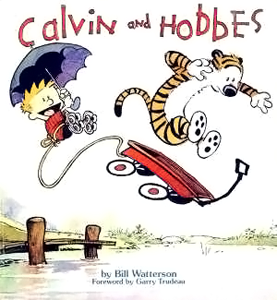Modern use
In Disney's 1977 animated movie, The Many Adventures of Winnie the Pooh , Tigger bounces himself to the top of a tree and is then afraid to climb down. This image of Tigger in the treetop is revealed to the viewer to be merely an illustration in a book when Sebastian Cabot, the movie's narrator, says, "Well Tigger, your bouncing really got you into trouble this time." Tigger, surrounded by the words of the story on the page around him, looks directly into the camera and says, "Say, who are you?" "I'm the narrator," answers Cabot. "Well please, for goodness' sakes, narrate me down from here!" pleads Tigger.
Cartoonist Bill Watterson of Calvin and Hobbes bridges into hypostasis in 1992 when Calvin, a cartoon, [2] draws a cartoon of himself and then criticizes his own lack of ability to draw.
A notable excursion into hypostasis is featured in Tom Stoppard's screenplay for the 1990 movie, Rosencrantz and Guildenstern Are Dead , in which two minor characters from Shakespeare's Hamlet wrestle with the growing realization that they are undifferentiated minor characters in a work of fiction.

William Boyd Watterson II is an American cartoonist who authored the comic strip Calvin and Hobbes. The strip was syndicated from 1985 to 1995. Watterson concluded Calvin and Hobbes with a short statement to newspaper editors and his readers that he felt he had achieved all he could in the medium. Watterson is known for his negative views on comic syndication and licensing, his efforts to expand and elevate the newspaper comic as an art form, and his move back into private life after Calvin and Hobbes ended. Watterson was born in Washington, D.C., and grew up in Chagrin Falls, Ohio. The suburban Midwestern United States setting of Ohio was part of the inspiration for Calvin and Hobbes. Watterson lives in Cleveland Heights as of January 2024.

Calvin and Hobbes is a daily American comic strip created by cartoonist Bill Watterson that was syndicated from November 18, 1985, to December 31, 1995. Commonly described as "the last great newspaper comic", Calvin and Hobbes has enjoyed broad and enduring popularity, influence, and academic and philosophical interest.

Don Quixote is a Spanish epic novel by Miguel de Cervantes. It was originally published in two parts, in 1605 and 1615. Considered a founding work of Western literature, it is often labelled as the first modern novel and one of the greatest works ever written. Don Quixote is also one of the most-translated books in the world and one of the best-selling novels of all time.

Tigger is a fictional character, an anthropomorphic stuffed tiger. He was originally introduced in the 1928 story collection The House at Pooh Corner, the sequel to the 1926 book Winnie-the-Pooh by A. A. Milne. Like other Pooh characters, Tigger is based on one of Christopher Robin Milne's stuffed toy animals. He appears in the Disney animated versions of Winnie the Pooh and has also appeared in his own film, The Tigger Movie (2000).

Stephan Thomas Pastis is an American cartoonist and former lawyer who is the creator of the comic strip Pearls Before Swine. He also writes children's chapter books, commencing with the release of Timmy Failure: Mistakes Were Made. The seventh book, It's the End When I Say It's the End, debuted at #4 on The New York Times Best Seller list for Children's Middle Grade Books.
Meta-reference is a category of self-references occurring in many media or media artifacts like published texts/documents, films, paintings, TV series, comic strips, or video games. It includes all references to, or comments on, a specific medium, medial artifact, or the media in general. These references and comments originate from a logically higher level within any given artifact, and draw attention to—or invite reflection about—media-related issues of said artifact, specific other artifacts, or to parts, or the entirety, of the medial system. It is, therefore, the recipient's awareness of an artifact's medial quality that distinguishes meta-reference from more general forms of self-reference. Thus, meta-reference triggers media-awareness within the recipient, who, in turn "becomes conscious of both the medial status of the work" as well as "the fact that media-related phenomena are at issue, rather than (hetero-)references to the world outside the media." Although certain devices, such as mise-en-abîme, may be conducive to meta-reference, they are not necessarily meta-referential themselves. However, innately meta-referential devices constitute a category of meta-references.

The Many Adventures of Winnie the Pooh is a 1977 American animated musical anthology comedy film produced by Walt Disney Productions and distributed by Buena Vista Distribution. It was first released on a double bill with The Littlest Horse Thieves on March 11, 1977.

Welcome to Pooh Corner is a live-action/puppet television series that aired on Disney Channel, featuring the characters from the Winnie the Pooh universe portrayed by actors in human-sized puppet suits, except Roo, who was originally a traditional puppet. The animatronic costumes used for the characters were created by Alchemy II, Inc., headed by Ken Forsse who later created Teddy Ruxpin. The show was first aired on April 18, 1983, the day The Disney Channel was launched. Its timeslot for its early run was at 8:30 a.m. Eastern/Pacific Time, making it the third program of The Disney Channel's 16 hour programming day. Reruns of the show aired on The Disney Channel until May 30, 1997. This is the last time Ralph Wright voiced Eeyore until his death in 1983 that Ron Gans took over full time on performing the character
Frazz is a syndicated comic strip by Jef Mallett about school custodian Edwin "Frazz" Frazier and the school and students where he works. The strip debuted on April 2, 2001, and as of 2019, appears in over 250 newspapers and is read by tens of thousands online each day.

Winnie the Pooh and Tigger Too is a 1974 American animated featurette based on the third chapter of Winnie-the-Pooh and the fourth and seventh chapters of The House at Pooh Corner by A. A. Milne. The featurette was directed by John Lounsbery, produced by Wolfgang Reitherman, released by Walt Disney Productions, and distributed by Buena Vista Distribution. It was released on December 20, 1974, as a double feature with the live-action feature film The Island at the Top of the World. It was nominated for an Academy Award for Best Animated Short Film, but lost to Closed Mondays.
Bill Watterson's comic strip Calvin and Hobbes features a wide range of secondary characters. These range from Calvin's fellow students at school to monsters and aliens from Calvin's vivid imagination.
Opposite Day is a make believe game usually played by children. Conceptually, Opposite Day is a holiday where things are said and done in an opposite manner. It is not a holiday on any calendar and therefore one can declare that any day of the year is Opposite Day to indicate something which will be said, or has just been said should be understood opposite to its original meaning. Although not an "official" holiday, it has recently become commonplace to celebrate Opposite Day on January 25th of each year.

Benjamin Bocquelet is a French-British animator, writer, director and producer, best known as the creator of the Cartoon Network animated series The Amazing World of Gumball. He was also the director of a short film called The Hell's Kitchen in 2003. When Cartoon Network Development Studio Europe was created in 2007, Bocquelet was hired in order to help people pitch their projects to Cartoon Network after the dismissal of Nickelodeon and Jetix subdivisions of Europe. However, when the studio decided to have its employees all pitch their own ideas, he decided to take some of the rejected characters he had created for commercials and put them all in one series, with a school setting. Daniel Lennard, Khaki Jones, and Brian A. Miller, the Vice President of Original Series and Development at Turner Broadcasting System, liked the idea and the series was ultimately greenlit.

Teaching with Calvin and Hobbes is an American children's textbook published in 1993. As a rare piece of officially licensed Calvin and Hobbes merchandise, it is a highly valued collectible.

Donkey Xote is a 2007 3D computer-animated children's film produced by Lumiq Studios. A co-production between Spain and Italy, the film is directed by José Pozo and written by Angel Pariente, based on the Miguel de Cervantes novel Don Quixote, and features the voices of Andreu Buenafuente, David Fernández, Sonia Ferrer and José Luis Gil. The film has gained notoriety as a mockbuster as the lead character Rucio bears an intentional resemblance to Donkey from the Shrek film series, along with the poster having the tagline "From the producers who saw Shrek".

Dear Mr. Watterson is a 2013 American documentary film directed by Joel Allen Schroeder, produced by Christopher Browne and Matt McUsic, with Andrew P. Waruszewski as the cinematographer. The film follows the career of Bill Watterson, the author of the comic strip Calvin and Hobbes, and the influence of both the author and the comic strip on the world.
Zen Pencils is an online showcase of cartoonist Gavin Aung Than's comic strips, which feature illustrations taking on famous quotations and making a visual style to create a story, shown along with the quotes. Zen Pencils focuses on adding to renown quotes being developed into visual metaphors to make insightful comics for the public. The site was first launched in February 2012 and is based in Melbourne, Victoria, Australia.
Calvin is a 2015 young adult novel by Martine Leavitt. It was published by Groundwood Books.











